

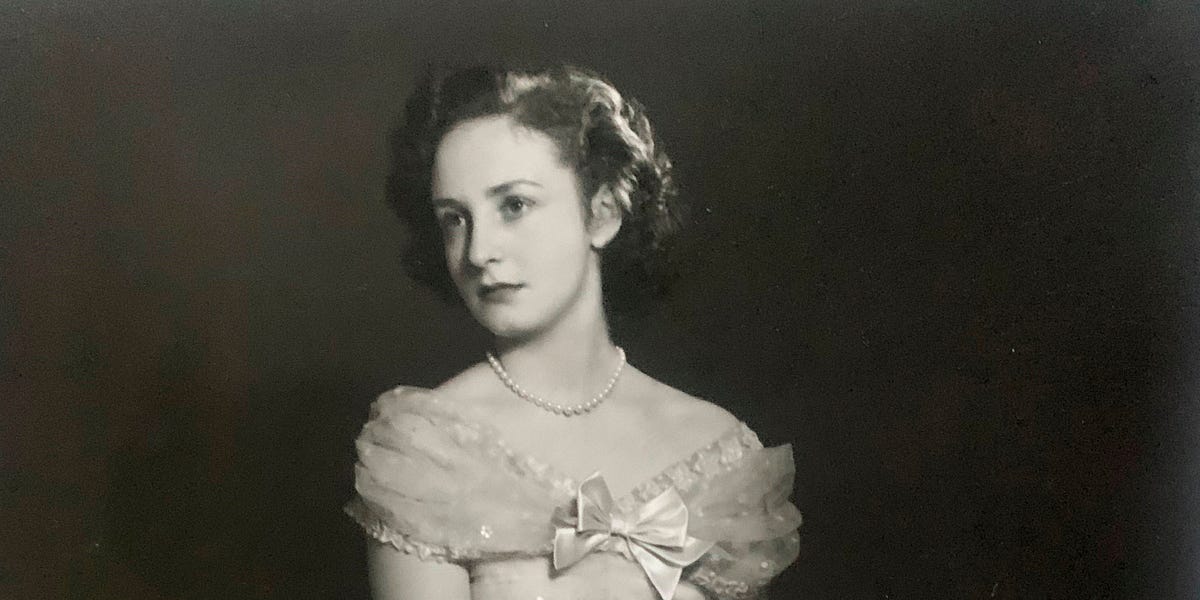
Perhaps the most beautiful royal wedding dress of the last century was that of the late Queen Elizabeth II in November 1947. Even though fabric was still rationed in the immediate aftermath of the Second World War, designer Norman Hartnell used a painting by Botticelli as inspiration for his ethereal satin creation, with its swooping garlands of pearl-and-crystal York roses entwined with ears of corn as well as an ethereal embroidered silk tulle train. The dresses of her eight bridesmaids repeated that same delicate style.
On July 2, Christie’s is auctioning one of those bridesmaid’s dresses, along with its headpiece, in its Exceptional Sale. While auctions of royal memorabilia are relatively common — on July 10, RR Auction sells letters written by Elizabeth II after the birth of her first two children, including this note: “The children’s grandmother is spoiling her eldest quite openly and will do so with Anne if she got a chance!” — it is far rarer to see royal and royal-related fashions worn at iconic royal events coming up for sale.
In recent years, there has been something of a mini boom of such items hitting auction sites, and often surging past estimates. The nature of the items makes them far rarer than letters, signatures, photos, and other items, which means that their exclusivity and known provenance can and does command much higher prices.
Prices for royal fashion items have skyrocketed as inexhaustible demand meets a finite supply. This week, Julien’s auctioned off pieces from the wardrobe of Diana, Princess of Wales, including some dresses that originally sold in her charitable auction, held weeks before her death. A Victor Edelstein tiered lace gown fetched US$910,000 (CAD$1.2 million), more than double its upper estimate. At the 1997 auction at Christies, that same gown fetched around US$25,000. At the Julien’s auction, that same amount could only buy a simple pair of Rayne shoes.
Given the huge demand for royal fashions, this bridesmaid’s dress from 1947 could easily sail past its estimate of 30,000-50,000 pounds (CAD$52,000 – 87,000).
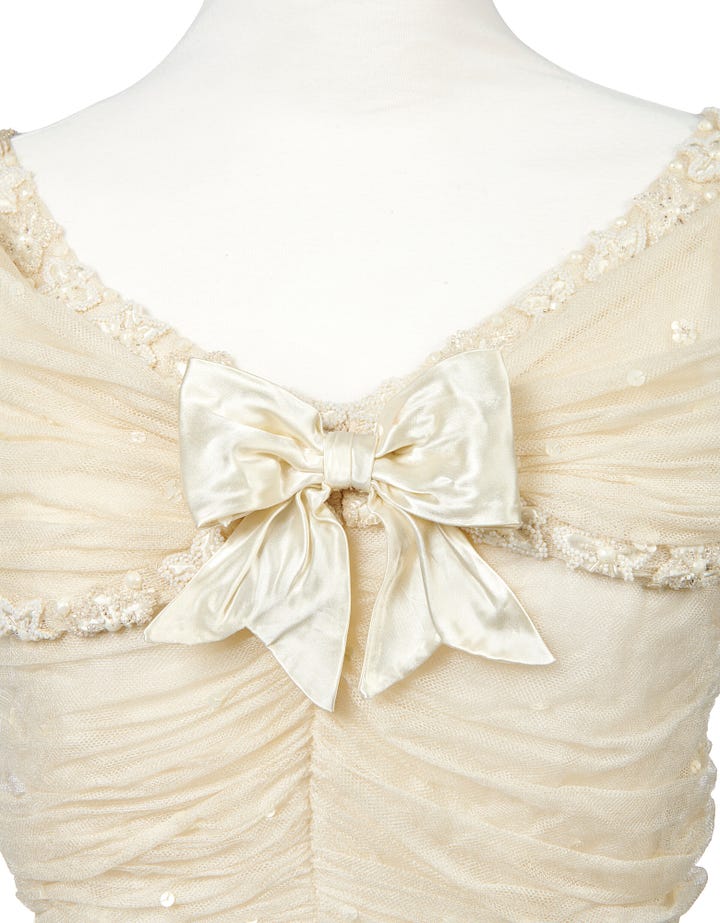
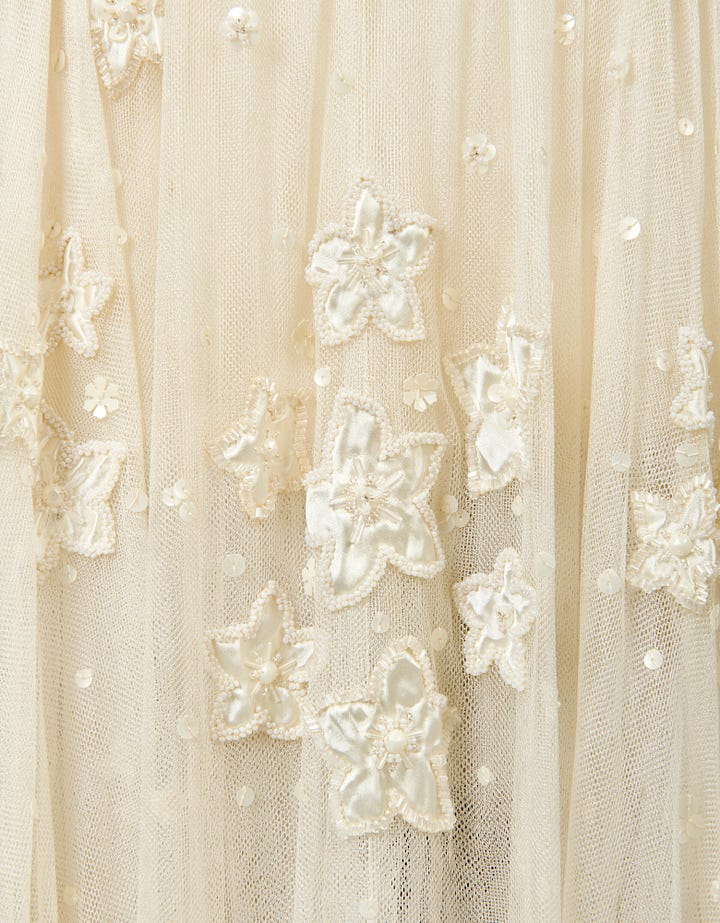
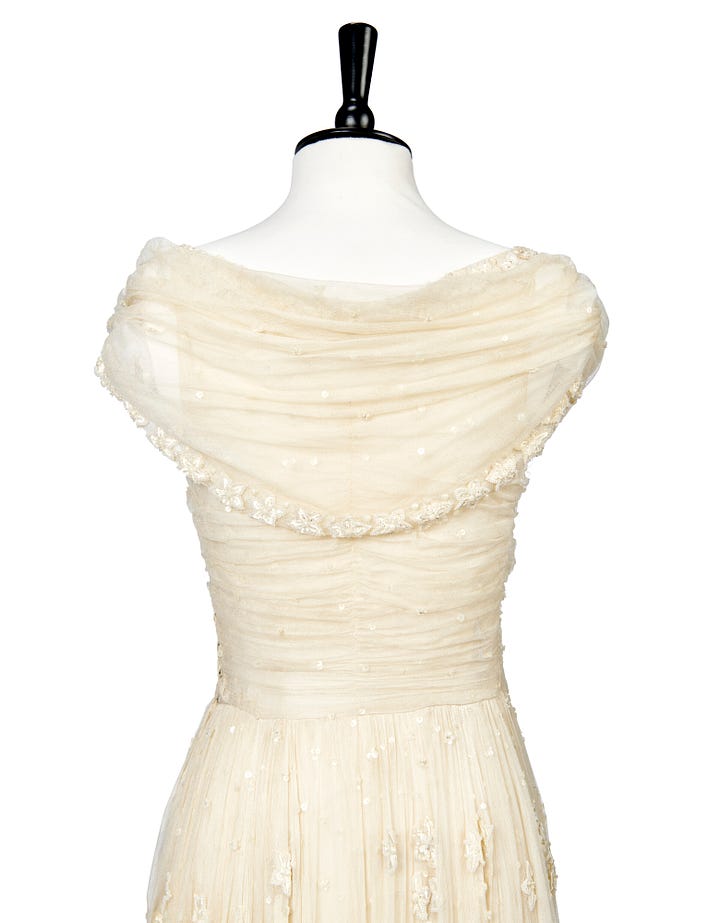
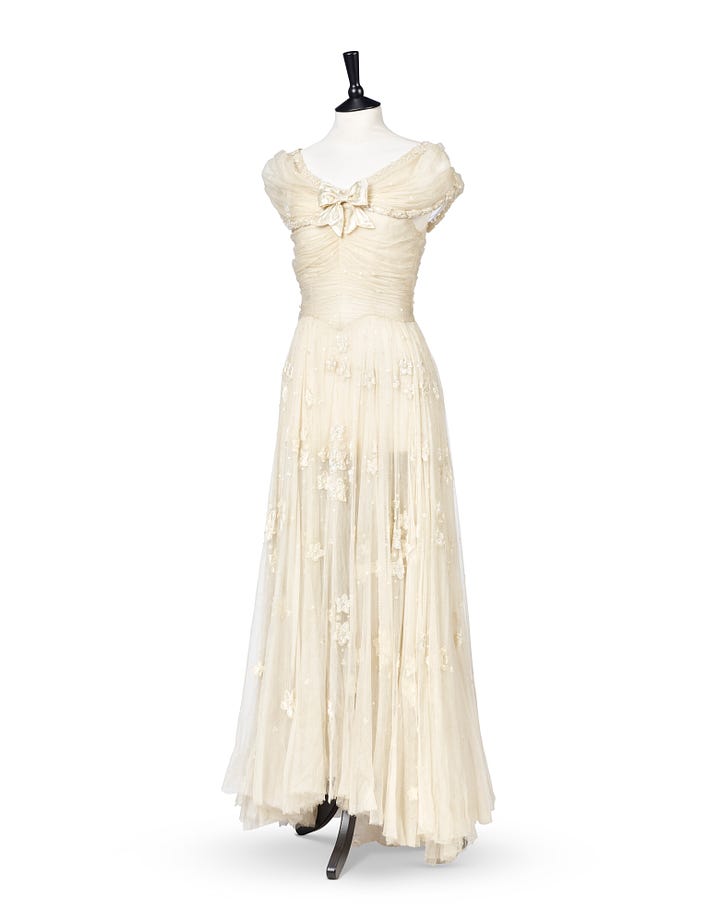
The dress was worn by Lady Elizabeth Lambart (later Longman), and is one of only eight in the world. Like the other bridesmaids, she had close connections to the royal family: both Queen Mary and her daughter, the Princess Royal (Princess Mary), were her godparents, while she was also was a friend of the bride, a relationship that extended from their childhood through until her death in 2016.
In Hartnell’s autobiography, Silver and Gold, the designer rhapsodized about those dresses:
To complete the bridal retinue, I was asked to provide dresses for the eight beautiful young girls of whom the bride’s sister, Her Royal Highness Princess Margaret, was the leading bridesmaid. I had already enjoyed the honour of making many dresses for Princess Margaret and had always noticed with what quick decision she chose her clothes. On this occasion, however, she most unselfishly preferred to state no opinion until the design had been also submitted for the approval of all the other bridesmaids.
These dresses were finally made of ivory silk tulle with a full flowing skirt and a tulle fichu swathed across the shoulders and fitted corsage. On the skirts was a milky way of small star-shaped blossoms embroidered with pearl and crystal. This repeated the motif of the bridal train.
For years, the dress had been on loan to the Fashion Museum Bath. In 1985, six years after the couturier’s death, the museum hosted a major exhibition of his clothes. “Hartnell: Clothes by the Royal Couturier, 1930s – 1960s” was a massive hit. Among the items on display was the Lambart (Longman) bridesmaid’s dress, that of Lady Pamela Mountbatten (later Hicks), the outfit worn that day by Queen Mary, as well as sketches, designs and embroidery samples.
Norman Hartnell’s first major client was the romance author Barbara Cartland in 1924. His clientele and reputation continued to grow. In 1935, he snagged his first royal commission: the plain pearl pink satin wedding dress of Lady Alice Montague-Douglas-Scott, who was marrying the Duke of Gloucester and whose bridesmaids included Princess Elizabeth and Margaret. Then came the maids of honour gowns for Queen Elizabeth at the 1937 coronation. The next year, his reputation went global with his sensational “white wardrobe” of Queen Elizabeth for the state visit to France; the colour palette was required because she was in mourning for her mother and didn’t want to wear black for such an important pre-war trip.
If there’s a Mount Everest of his career, it came in 1953 when he designed Elizabeth II’s coronation dress, as well as many of her outfits for the subsequent coronation tour. During his career, he had Royal Warrants from three queens — Mary, Elizabeth (mother), and Elizabeth II (daughter).
Hartnell was, the exhibition explained, “responsible for the modern vision conjured up by the phrase ‘The Queen of England’: the unchanging picture of a woman in a richly ornate, glittering and bejewelled evening dress, tiara, and Garter riband. … They constitute what Hartnell himself called ‘the regal renaissance of the romantic crinoline’ for formal and state occasions, a fairy tail romantic look which uses chiffon, net and velvet to create Majesty with glamour.”
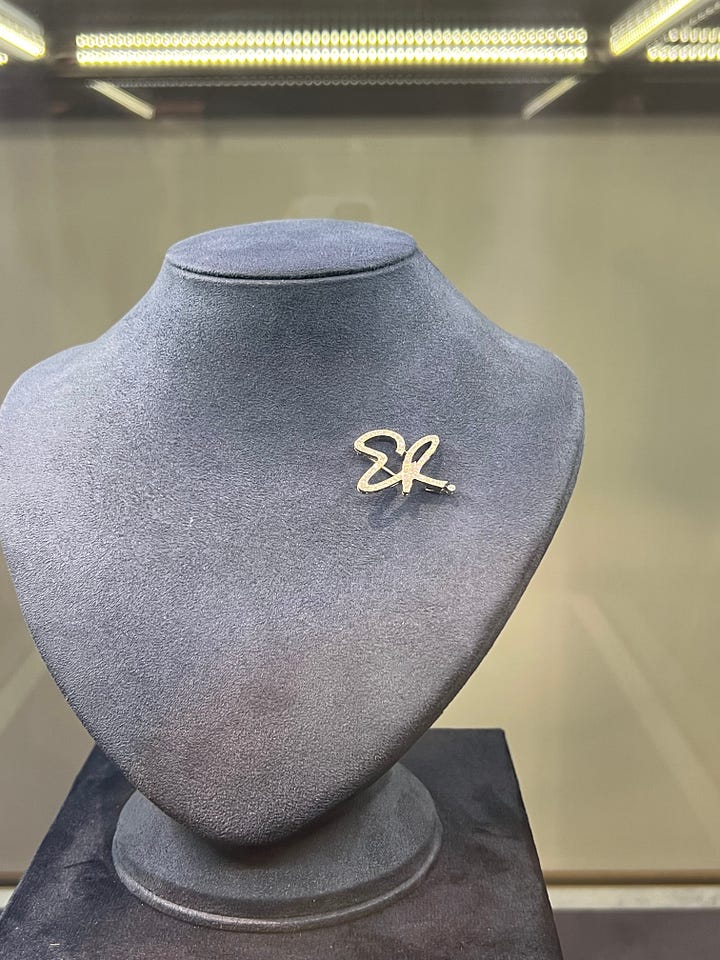
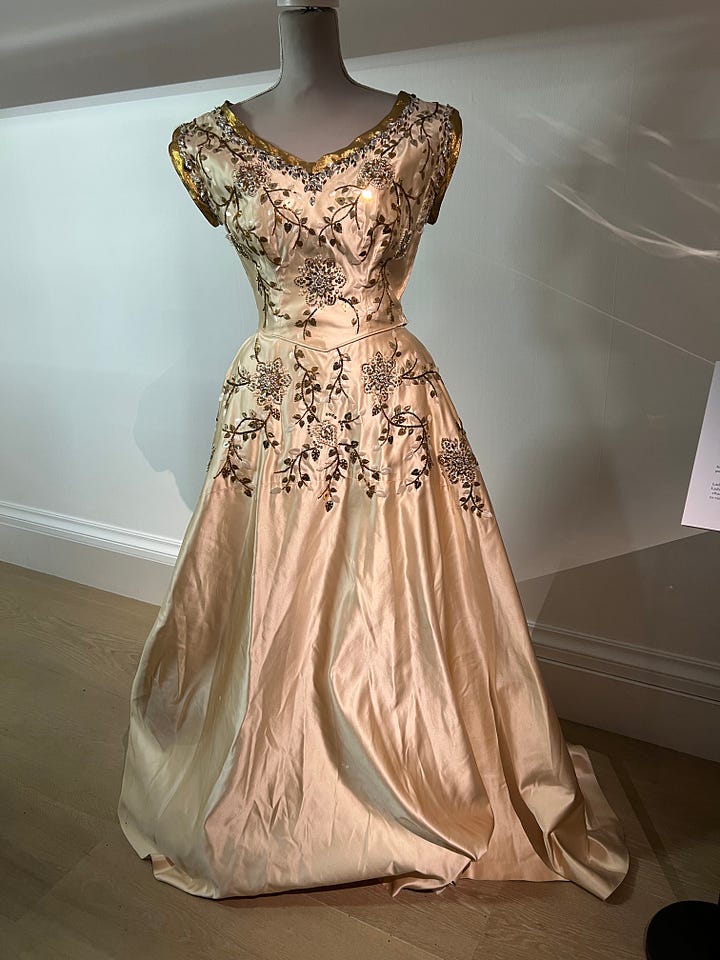
While the bride’s dress and coronation gown are in royal hands and will never reach an auction floor, items worn by the late Queen’s attendants continue to come up for auction. Two days before last year’s coronation of King Charles III, Sotheby’s held a sale of historic royal items. Included was a simple “ER” diamond brooch, made by Garrard. The late Queen Elizabeth II gave an identical brooch to each of her six Maids of Honour as a thank you for their service at her coronation in 1953. For the display of royal items at its London headquarters, Sotheby’s featured an original Hartnell maid of honour dress worn by Lady Moyra Campell (later Campbell-Grove), which is now in the the Ulster Museum.
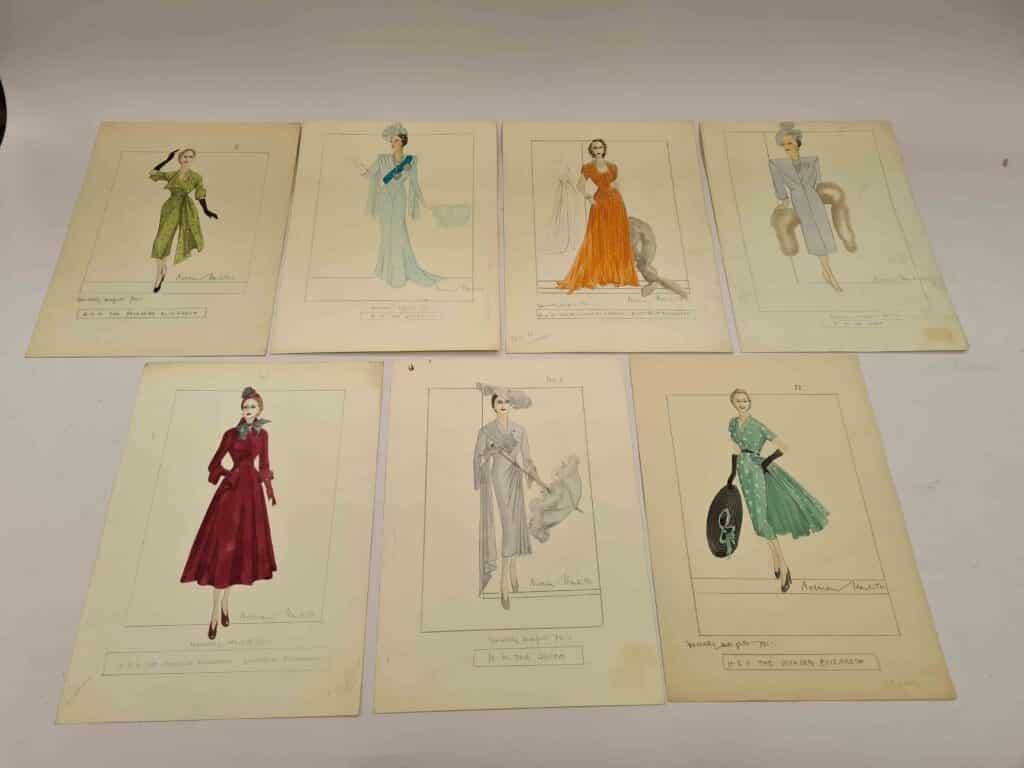
The Longman bridesmaid’s dress and the clothes of Diana may be out of the price range of most royal collectors, yet there’s also been a surprising amount of affordable royal style items up for sale recently. Last year, Hansons sold a major collection of Hartnell memorabilia, including an extraordinarily rare framed embroidery sample from the Queen’s coronation dress. Individual sketches of royal outfits created by Hartnell carried estimates of just 200-250 pounds.
My latest Royal Roundup segment on The Morning Show on Global Television (June 24, 2024)